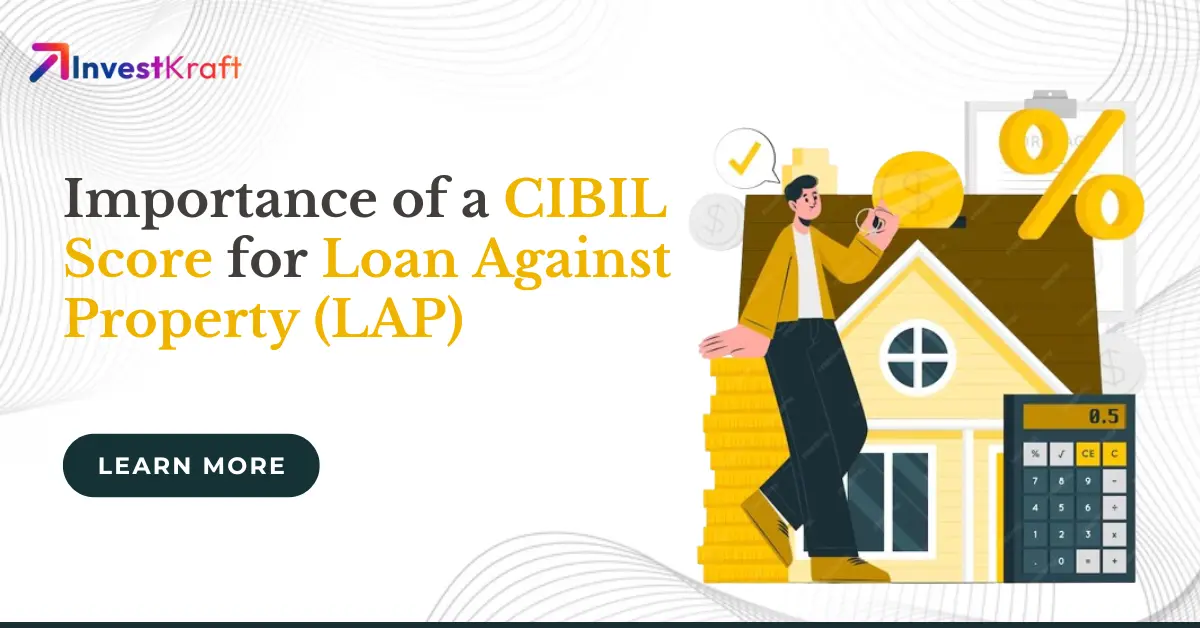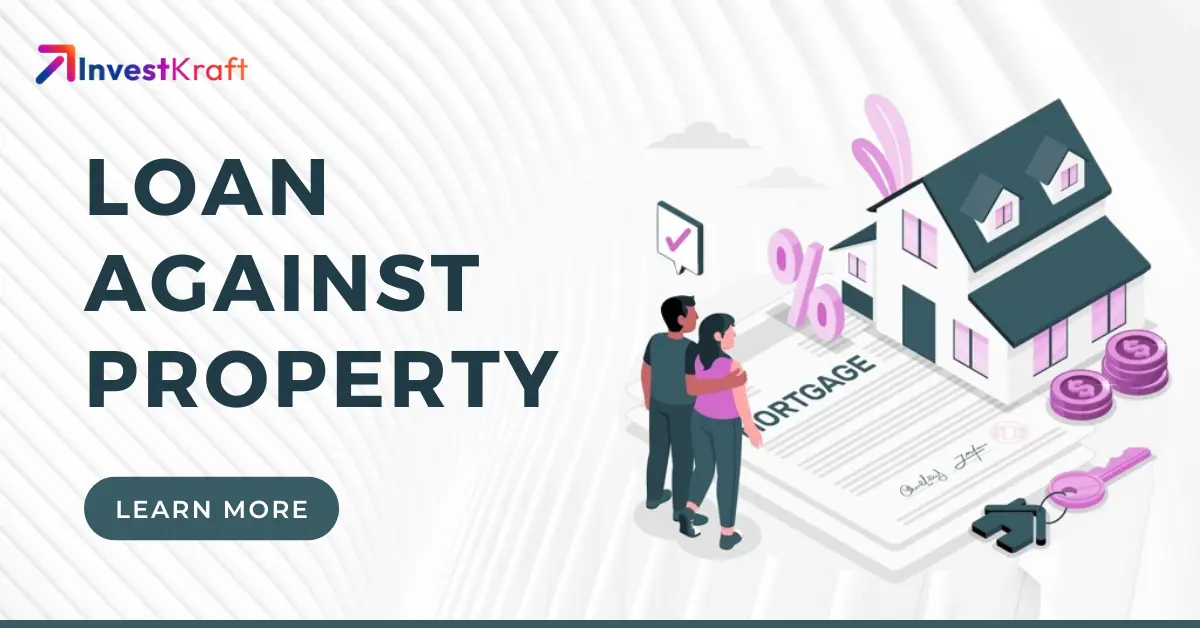Low CIBIL Score Strategies to Secure a Loan Against Property 2024

Obtaining a loan against property is a major achievement, especially for those with low or imperfect CIBIL scores. CIBIL score holds substantial weight in assessing creditworthiness and a low score can be a major obstacle in accessing favourable loan terms.
It is possible to secure a loan against a property with a low CIBIL score by implementing strategic planning and proactive measures. By improving your credit score, you can enhance your chances of obtaining a LAP. This guide will provide effective strategies for navigating the complexities of the lending landscape and increasing the chances of loan approval.
How Does a Loan Against Property Help an Individual?
A loan against property provides a secure option for both self-employed and salaried individuals. It requires the mortgage of a commercial or residential property as collateral. This type of loan benefits those looking to access funds with a lower interest rate and longer repayment period.
The lender will consider the property's current value to determine the approved caredit amount. Borrowers can mortgage either their property or another piece of land they own. However, the borrower must ensure they have a clear title to the property before applying for a loan using it as collateral.
Benefits of a loan against property include the following:
- When applying for a loan against property, various types of properties can be utilized as collateral, including self-occupied land or residential and commercial properties. Despite using the property as collateral, the borrower retains ownership and can continue to use it while accessing funds.
- A loan against property offers borrowers the benefit of low interest rates, resulting in lower EMIs. This helps to reduce the overall financial burden for borrowers.
- A loan against property is a secured loan, so borrowers can get a higher amount compared to unsecured options like personal loans. The exact loan amount depends on the current market value of the property.
- A loan against property typically offers more flexibility in repayment terms compared to a personal loan, with tenures extending up to 15 years. This longer tenure can help reduce the financial strain on the borrower, making it a more feasible option for those seeking a longer-term loan.
- Section 31 of the Income Tax Act provides tax benefits on the interest rate for loans against property. Additionally, Section 24 of the Income Tax allows for a tax deduction of 2 lakh rupees specifically for loans against property used for building a new house.
Is a Loan Against Property with a Low CIBIL Score Possible?
Yes, getting a loan against property with a low CIBIL score is possible but it may come with challenges. Compared to applicants with high scores, low-score applicants may face more obstacles in securing the loan. It is important to be aware of these challenges before applying for a LAP. Keep these key points in mind:
- Higher Interest Rates: A low credit score makes lenders view borrowers as more risky, leading to higher interest rates on loans against property. Lenders often impose these higher rates to mitigate the risk associated with low CIBIL scores.
- Lower Loan-to-Value (LTV) Ratio: Borrowers with a lower credit score may find that they are offered a reduced Loan-to-Value (LTV) ratio, resulting in a smaller loan amount about the property’s value. This means that they may need to provide a larger down payment to meet the lender’s requirements.
- Stricter Eligibility Criteria: Some lenders impose stricter eligibility criteria, such as higher minimum income thresholds, for individuals with a low CIBIL score. This means that borrowers with a lower credit score may face tougher requirements when applying for loans from these lenders.
How Does a Low CIBIL Score Impact a Loan Against Property (LAP)?
Here are a few things you need to be prepared for if you have a low CIBIL score -
- A low CIBIL score results in a lower borrowing limit for loans against property, which can be as low as 55% of the property value. Check with loan aggregators for better options.
- A higher CIBIL score ensures better loans against property rates. On the other hand, a low CIBIL score leads to higher interest rates. Always negotiate for the best deal.
- Low CIBIL scores result in high processing fees. Lenders conduct extra reviews for individuals with low scores and charge lower fees for those with good scores, aiming to lend to those with a better repayment record.
- A low CIBIL score leads to more credit inquiries and longer processing time for loans, taking about 2 to 3 weeks for loan approval.
- A good CIBIL score means less documentation for loans. A poor score requires more documents like tax history and income proofs. In such cases, patience and submission of requested documents are necessary.
- Lenders may reject applications due to small discrepancies or suspicion of misinterpretation. Keep trying with different lenders, including those who consider applicants with no credit history.
What are the Strategies to Secure a Loan Against Property with a Low CIBIL Score?
Do not worry about your bad credit score when applying for a loan against property. Banks do not give much importance to CIBIL scores for secured loans. However, if you have a bad credit score, there is a possibility of being charged a higher interest rate. To improve your credit score, make sure to pay your EMIs on time.
To increase your chances of securing a loan against property, consider implementing these straightforward tips -
- Add a co-applicant with a strong credit history can significantly improve your prospects of getting approved for a loan against property. It offers the bank additional assurance and reduces the risk, making the application more appealing. If your spouse has a favourable credit score, consider adding them as a co-applicant to strengthen your loan application.
- A guarantor with an excellent credit history can help you secure a loan against property even if your CIBIL score is borderline. Financial institutions are more likely to approve the loan without any complications in such cases.
- Lowering the Loan-to-Value (LTV) ratio from the lending institution can be a good option if you have a bad credit score. LTV represents the amount a borrower can receive against a property from a financial institution. By seeking a lower LTV, you can reduce the amount you need to pay upfront and increase the financing provided by the institution.
- One option for individuals with a low CIBIL score is to approach Housing Finance Companies or HFCs. Some HFCs offer mortgage loans to those with bad credit scores. It is important to note, however, that the application processing for these loans can be time-consuming and the interest rate may be high.
Key Considerations Before Applying for a Loan Against Property
Here are some crucial considerations that an individual applying for a loan against property must take into consideration -
- Consider the property’s condition, age, location and amenities when evaluating its value for a loan against property. Well-maintained properties increase the chances of loan approval. Look for lenders offering a high LTV ratio, typically between 75% and 90%, to access a significant portion of the property’s value. This approach ensures an accurate property evaluation and maximizes borrowing capacity for your financial needs.
- Determine the loan amount needed for LAP by planning a budget for current and future expenses. This ensures borrowing only what is necessary and avoids financial strain. Assessing monetary requirements helps meet specific needs and simplifies the borrowing process, aligning with fiscal objectives.
- LAP offers flexible repayment for 3 to 15 years. Consider income and expenses to align with financial capacity. Use our EMI calculator to make informed decisions. Longer tenure means affordable EMIs but more interest. A shorter tenure means less interest but higher EMIs. Find the right balance for a repayment plan that suits your situation.
- To enhance chances of loan approval, understand the lenders’ eligibility criteria, familiarize yourself with requirements, meet every criterion, minimize loan rejection risk, expedite the approval process, align application with lender’s parameters, secure loan, protect credit score and expedite financial aspirations.
- Compare LAP terms and conditions from different lenders to make an informed decision that suits your needs. Variations in interest rates, fees and LTV ratios require attention. Optimize benefits and secure favourable terms by comparing lenders.
Conclusion
A low CIBIL score can indeed make it challenging to get LAP approval but it is not impossible. By thoroughly understanding the obstacles, implementing effective tactics and taking all aspects into account, you can increase your chances of securing the loan and reaching your financial objectives.
Frequently Asked Questions (FAQs)
Q: Can I get a Loan Against Property with a bad credit score?
A: Securing a LAP with a low CIBIL score can be more challenging as lenders see the score as an indicator of creditworthiness. A low score suggests a higher risk of missed payments, but offering property as collateral can make LAP a more secure option for lenders.
Q: Is there a minimum CIBIL score requirement for a Loan Against Property?
A: Most lenders in India prefer a CIBIL score of 700 or above for approving a loan against property, although there is no specific minimum score required. Having a lower score may make it harder to secure a LAP, but it is still possible to get approved.
Q: How much time does it typically take to get a Loan Against Property approved with a low CIBIL score?
A: Processing times for LAP applications are influenced by the lender’s internal procedures and the complexity of the case. Applicants with a low CIBIL score may experience longer processing times, as lenders often conduct a more thorough evaluation. Therefore, those with a low credit score can generally expect a processing timeline of 2 weeks to a month for their LAP applications.
Q: Can I use a property jointly owned by someone else as collateral for a LAP?
A: Yes, you can use a jointly owned property for LAP as long as you have written consent from all co-owners. It is important to involve all co-owners. It is important to involve all co-owners in the application process to ensure a clear understanding of the loan terms and potential risks.
Q: What happens if I fail to repay a Loan Against Property?
A: The lender can repossess your property to recover unpaid dues if you fail to repay the loan, possibly resulting in a forced sale of your property to settle the debt.
Q: Are there any government schemes that offer LAP with a relaxed CIBIL score requirement?
A: Government schemes tailored specifically for LAP with relaxed credit score requirements are currently not available. However, certain government-backed lenders may have slightly more flexible eligibility criteria compared to private lenders. Therefore, it is recommended to consider LAP options from public sector banks in addition to private institutions.
Q: Is a guarantor mandatory for a LAP with a low CIBIL score?
A: No, a guarantor is not always mandatory for a low CIBIL score LAP but having a creditworthy guarantor can enhance your chances of approval. The guarantor serves as a security for the lender, ensuring repayment in case of default.
Q: What are the tax implications of taking a Loan Against Property?
A: It is important to note that the interest paid on a LAP can be claimed as a tax deduction under section 24(b) of the Income Tax Act but certain conditions need to be met. For personalized guidance on the tax benefits that apply to your specific situation, we would recommend consulting a qualified tax advisor.
Q: Can I use a LAP for purposes other than business needs or debt consolidation?
A: LAPs are typically used for business or consolidating debt, but some lenders might allow you to use the money for medical emergencies or education expenses. It is important to confirm with the lender if they have any specific guidelines for how the loan amount can be used.
Q: Should I consider a co-applicant with a high CIBIL score even if I own the property myself?
A: Having a co-applicant with a strong credit history can make a big difference in getting approval for a loan against property, especially if you are the sole owner of the property. The co-applicant’s high credit score can boost the overall strength of the application and provide the lender with added confidence in the repayment capacity.
Q: What if my property is located in a non-prime area? Will it affect my LAP eligibility?
A: The location of the property you are interested in can affect your LAP eligibility and loan conditions. Properties in desirable locations with a higher market value typically result in more favourable loan-to-value (LTV) compared to properties in less desirable areas. This means that a lower LTV might result in a smaller loan amount for your property.
Q: Is there a penalty for prepaying a LAP if I secure a better interest rate elsewhere later?
A: Make sure to thoroughly examine the prepayment clause in the loan agreement before signing up for an LAP, particularly if you are opting for a fixed interest rate. If you have a low CIBIL score and limited options, it is worth considering a lender that offers prepayment flexibility, enabling you to refinance the loan if you manage to secure a better rate in the future.

Author: Abhik Das
Abhik Das is a versatile content writer with over 5 years of experience crafting engaging and informative content across diverse industries. His expertise spans the fields of ed-tech, pharmaceuticals, organic food, travel, sports, and finance.
Here's what sets Abhik apart:
Content Versatility: Able to adapt writing style and tone to suit various audiences and content needs.
SEO Proficiency: Creates content optimized for search engines, ensuring discoverability and organic traffic.
Deep Research: Conducts thorough research to ensure content accuracy and credibility across complex topics.
Engaging Storytelling: Captures reader interest with clear, concise, and compelling writing.
Abhik's diverse background empowers him to deliver insightful content across a wide range of subjects. Whether you're seeking engaging explainer pieces on the latest financial trends, informative guides to organic food choices, or captivating travelogues, Abhik has the expertise to craft content that resonates with your audience.









.webp)




.webp)




